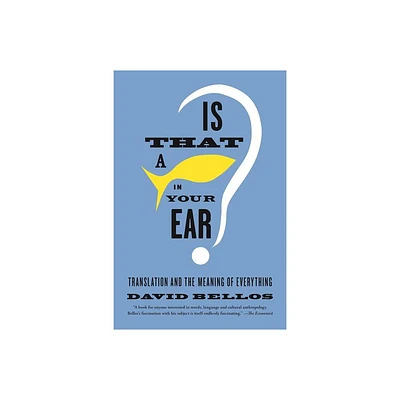Home
A Word in Your Ear: Poems
Loading Inventory...
Barnes and Noble
A Word in Your Ear: Poems
Current price: $16.95


Barnes and Noble
A Word in Your Ear: Poems
Current price: $16.95
Loading Inventory...
Size: OS
*Product Information may vary - to confirm product availability, pricing, and additional information please contact Barnes and Noble
A Word in Your Ear
brings together forty years of poetry by one of the most influential literary critics of our time. Monroe Spears, the first mentor to James Dickey, was an internationally renowned scholar of Modernism who in addition to writing his own many essays, reviews, and books brought distinguished poetry, fiction, and criticism into print as editor of the
Sewanee Review.
In this important collection, he demonstrates that his eye for discerning excellent poetry was paired with a remarkable talent for writing it.
Employing a rich variety of verse forms and subjects, Spears reflects on the passage of time—specifically, the maturation from boyhood to old age—and its effect on his view of himself and the world. “To go from adult to old man / Is truly to change into another species, / Apart as a lame duck, having no space in the future.” Though gloomy in itself, this theme is often treated with levity, which makes the ominous secrets whispered in the ear not only bearable but also enjoyable.
Spears’s poems reveal an often wry conversationalist whose voice ranges from public wit to private confidant. In “Pas de Deux,” the poet imagines a beautiful ballerina and her romantic dance partner behind the scenes: “Backstage, she’s horse-faced, duck-butted, hating men, / While he loves nothing else. They hate each other. / . . . Which of us would not rather / Believe them onstage? Their image there’s not false, / but twin / To what we all produce: illusion is our mother.”
Because Spears did not devote himself solely to the practice of poetry, his body of work is regrettably small. But with his final collection, he confirms a truth confessed in the appropriately titled “A Poet Hidden”: “He always knew at heart he was a poet.”
brings together forty years of poetry by one of the most influential literary critics of our time. Monroe Spears, the first mentor to James Dickey, was an internationally renowned scholar of Modernism who in addition to writing his own many essays, reviews, and books brought distinguished poetry, fiction, and criticism into print as editor of the
Sewanee Review.
In this important collection, he demonstrates that his eye for discerning excellent poetry was paired with a remarkable talent for writing it.
Employing a rich variety of verse forms and subjects, Spears reflects on the passage of time—specifically, the maturation from boyhood to old age—and its effect on his view of himself and the world. “To go from adult to old man / Is truly to change into another species, / Apart as a lame duck, having no space in the future.” Though gloomy in itself, this theme is often treated with levity, which makes the ominous secrets whispered in the ear not only bearable but also enjoyable.
Spears’s poems reveal an often wry conversationalist whose voice ranges from public wit to private confidant. In “Pas de Deux,” the poet imagines a beautiful ballerina and her romantic dance partner behind the scenes: “Backstage, she’s horse-faced, duck-butted, hating men, / While he loves nothing else. They hate each other. / . . . Which of us would not rather / Believe them onstage? Their image there’s not false, / but twin / To what we all produce: illusion is our mother.”
Because Spears did not devote himself solely to the practice of poetry, his body of work is regrettably small. But with his final collection, he confirms a truth confessed in the appropriately titled “A Poet Hidden”: “He always knew at heart he was a poet.”


















